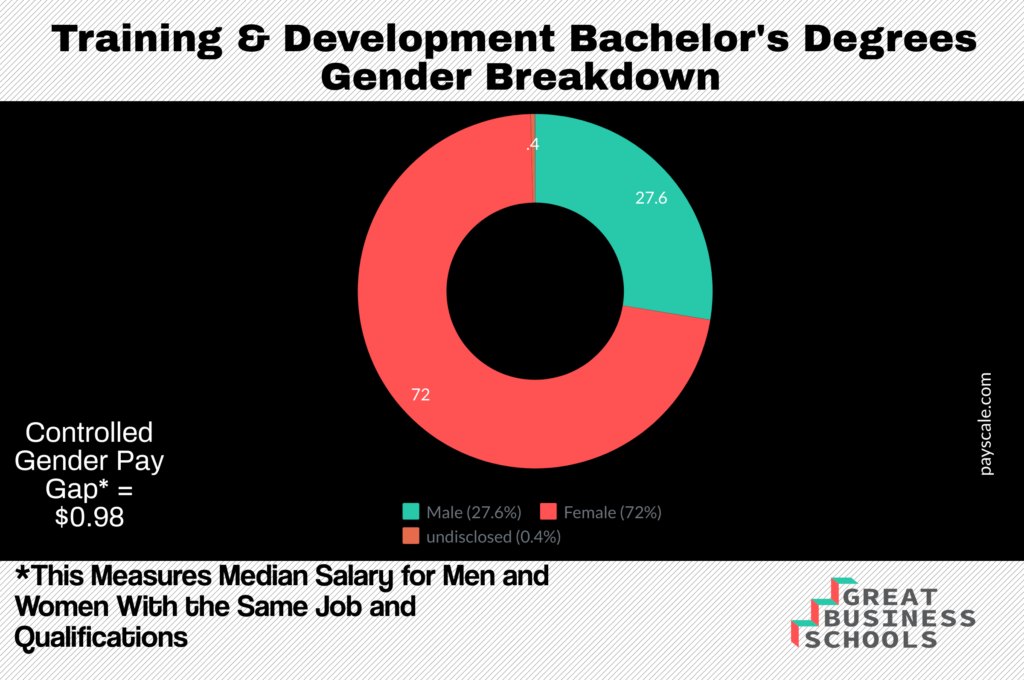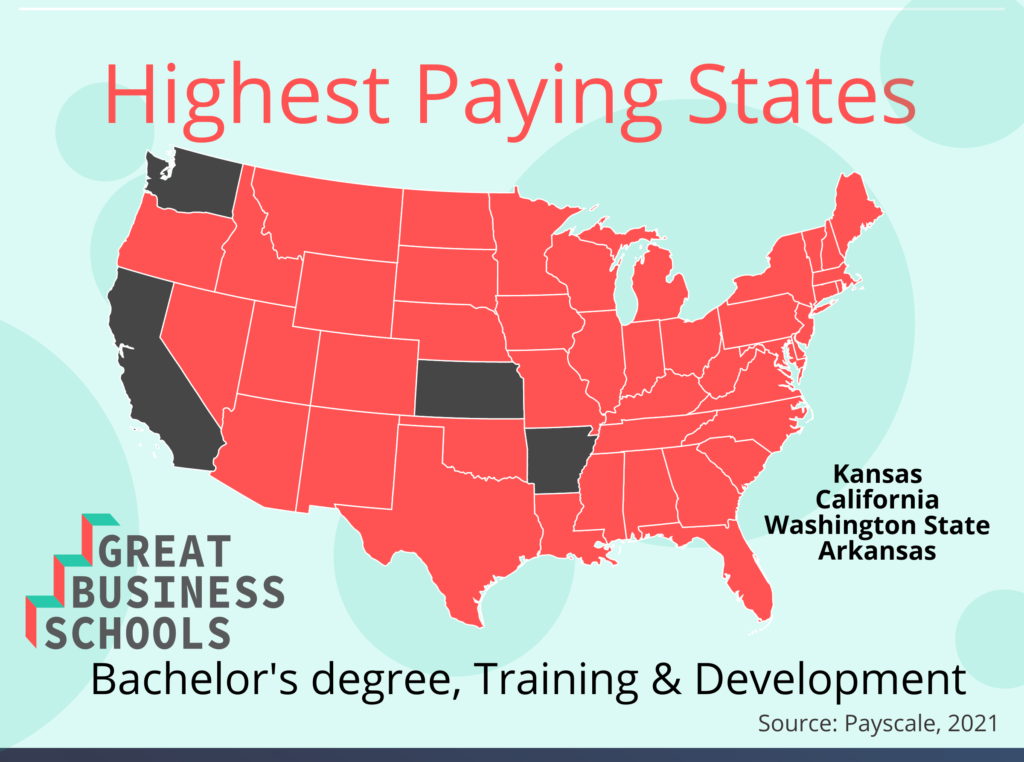A Human Resources Training and Development degree revolves around developing educational programs that will allow every member of your workforce to reach their fullest potential. Individuals who pursue these degree programs are excellent communicators with exceptional people skills. The programs they develop not only benefit the company but also provide each employee with valuable skills that allow them to become more efficient and productive when it comes to performing their duties. Along with that proficiency, comes the confidence to work toward higher goals and take on more responsibilities.
What Is HR Training and Development?
The importance of human resource training and development becomes apparent when you are trying to ensure that your employees have the necessary skills to be proficient at their jobs. The Human Resources Department does exactly what the name implies. It manages the company’s workforce, the human resources the company relies on to meet its goals and objectives. By maximizing the potential of every person that makes up the workforce, the company will continue to be successful and productive. It should be the goal of every person with a Training and Development Master’s degree to assist in making this happen.

The Human Resources Training and Development team is responsible for making sure each member has the skills they need to perform their duties. They must also be able to remain in compliance with state and federal safety regulations. This may require special training that is unique to the type of work they perform. With an HR Training and Development Master’s degree, a person can develop the type of training programs that are needed and make sure every employee completes the courses successfully. Organizing and maintaining accurate training records will ensure that every person has the proper training and that their certifications or licenses do not expire or lapse.
Within the Human Resources department, you have several different offices. The Training and Development team is responsible for making sure everyone throughout the entire company has the training they need to be successful in their own position. Whether you hire a training company to come in or prefer to do the training on your own. It is up to the team to ensure the company is able to be as productive and successful as possible. Maintaining certifications and licensures may require training from a third party agency. If this is the case, it is up to the Training and Development team to make it happen.
Accreditation for Training and Development Programs
Accreditation is a form of verification that means the information being provided to students has been closely scrutinized and meets or exceeds industry standards according to professional agencies within each field. There are two types of accreditation. Regional accreditation is the process for reviewing learning institutions like colleges and universities. Specialized accreditation is used for reviewing degree and certification programs. Both types of reviews are ongoing and must be performed on a regular basis to ensure each remains in compliance.
Accreditation is an ongoing process. Once a school or degree program has received its accredited status, it must continually be reviewed on a regular basis in order to ensure that it always meets industry standards. If at any time, it fails to do so, it must reapply to go through the accreditation process all over again. As long as it passes each review, its status will remain in place. Each industry and accrediting organization has its own review process. Reviews may be performed once a year or maybe every two years if the curriculum does not change.
Regional Accreditation
Colleges and universities must go through a specific process to verify that their programs and methods of instruction surpass the standards of educational excellence. Several aspects of the school’s programs and methods are placed under strict scrutiny to verify that students are receiving all of the resources they need to be able to complete their educational programs. Testing and grading protocols are closely examined as well as how the faculty provides instruction. In order to receive accredited status, the university must be able to meet the strictest standards of the accrediting organization,
Specialized Accreditation
Specialized accreditation is to ensure that degree programs and certification courses meet or exceed the standards for the industry the program represents. The accreditation process involves ensuring that every course in the degree program provides the most accurate and up to date information possible so that students receive the highest quality education. Textbooks and all other course materials used within the degree program must meet the highest standards to ensure students have all of the necessary skills to be able to perform effectively. Specialized accreditation must be reviewed on a regular basis to ensure any new teaching materials or curriculum maintain the highest standards required for accreditation.

Types of Training and Development Degrees
A Bachelor’s degree in Training and Development is one of the first degrees you can pursue when entering the HR Training and Development field. An Associate’s degree is most often made up of the core classes any degree program requires. Completing the most basic courses will allow you to be hired into an entry-level position with the Human Resources department of most companies. Choosing to pursue a Training and Development degree is the first step in building a career as an employee educator. This type of degree is often a stepping stone to many other types of career opportunities.
Enrolling in a Bachelor’s degree in Training and Development will start to build the skill set a student needs if they want to be able to teach others. Students will be taught how to develop specific courses or how to adapt outside courses so they will best benefit the employees within their company. Students are also taught how to keep adequate records on what training was offered when it was performed, and when it will expire. As part of a Human Resources Training and Development team, it is up to the student/graduate to be able to use their programs to improve overall employee performance in a company setting.
A Master’s degree in Training and Development takes what was taught in the Bachelor’s degree program a step farther. Both teaching and management skills are expanded upon giving the student the ability to develop more complex programs, taking what is being taught to a higher, more complex level. The student must be able to exhibit advanced teaching skills to ensure that those who take their courses, not only understand what is being taught but are able to use the information effectively. As an educator, it is up to you to provide the graduate with usable skills at an advanced level.
An online Training and Development degree is one of the most effective and convenient of the degree programs offered in this area. Enrolling in an online degree program gives students an opportunity to work while attending class. If they are already working in a Human Resources department, they are able to gain valuable experience. This allows them to apply what they are learning in class to real-life situations to get the most out of what they are studying. Online learning also allows students to study from any location, even if the student is traveling.
Accelerated Training and Development degree programs, at either the Bachelor’s or Master’s level, are designed to allow the student to complete their coursework in a shorter period of time than if they had opted for a traditional degree program. For example, a 2-year degree can be completed in less than 18 months or a 4-year degree can be wrapped up less than 3-years. By putting more information into fewer lessons, graduates are able to complete their program in much less time. Accelerated programs can be completed in the classroom or using an online platform for maximum convenience. The amount of time that is shaved off due to the condensed coursework is time well-spent if you use it to look for a job that you will truly enjoy.
Certifications and Licensures
With HR Training and Development degree programs, certification or licensure may not be required. This will depend on your job description and what role you play in the training and development process. If you play an administrative role and deal with the management of specific records and training schedules, licensing and certification may not be required.
If you are an instructor or are responsible for developing content for courses being taught, certification and licensure are important. As a licensed/certified educator, it shows you have met the necessary criteria to be able to teach a specific course or program. Instructors may be certified to teach multiple classes and are able to combine classes when it is beneficial. The instructor must be able to prove that the student is proficient in both if they are to pass the class and receive their certification.
Many classes that are taught within a company will provide the student a certificate that is solely for the company’s record. Other courses that are sponsored by OSHA, the American Red Cross, or the American Heart Association, may offer certificates that are recognized publicly. In order for an instructor to teach those courses, they must be licensed or certified by the organization that provides the course. Individuals who have earned a Bachelor’s or Master’s in Training and Development may be able to use their degree to offer classes by specific organizations if they take the necessary courses and become certified through the organization’s own system.

Careers in Training and Development
There are many career paths in the Training and Development field. Whether you are on the administrative side or the educational side, this degree path can be incredibly rewarding. In this field, you will be responsible for providing employees the tools they need to become more efficient and productive. They will be able to move forward in the workplace and achieve whatever goals they may have set for themselves. As an employee, you may be required to take specific courses as part of your job. Taking courses for your work will also give you valuable skills that you can include on your resume if you ever choose to change jobs.
Employee Training Manager
Employee training managers take on several roles. They must maintain accurate records so they can remind employees when certifications expire or if new training is available that they need. It is up to the manager to make sure every employee has the training that is required for them to do their job effectively. In most cases, employee training managers are also the ones who teach the classes. It is up to them to follow protocols and make sure employees understand what they are being taught. Employee training managers are responsible for setting up courses and scheduling them so that every employee has an opportunity to attend one of the classes being offered.
Employee Training Director
An employee training director is in charge of the training team within the Human Resources department. They are responsible for overseeing the employee training managers and making sure that programs being taught are within the scope of training of the manager. It is up to the director to ensure that all records are as accurate and up-to-date as possible. Within the Human Resources department, the employee training director is the one who is approached when new training programs need to be added or discontinued. Employee training directors often have the final say when it comes to training and development concerns. As a director, they would responsible for all of the managers who work underneath them. They, in turn, would answer to the head of the Human Resources department.
Program Manager: Learning and Development
Program managers that work with learning and development are in charge of knowing what subjects, skills, protocols, and techniques are needed and then developing classes that will provide them to the employees. The program manager must develop the course so that the materials apply to the needs of the company. They must also be able to develop testing or exams that allow the instructor to prove that the employee understands what they were taught and is able to utilize those lessons while in the workplace. Program managers must work hand in hand with both the Training Manager and the Training Director to ensure that every aspect of the course meets the company’s standards.
Training Specialist
A training specialist is someone who matches an employee with a specific position based on the skills and abilities they possess. It is up to the training specialist to be able to identify possible matches between employees and specific positions. Once a match has been made, the employee can begin working in that position. If there are programs available that an employee would like to sign up for, it will expand their skill sets making them a candidate for a wider variety of jobs. This increases the value of the employee and makes it easy for them to be productive. Employees who are extremely versatile can move from position to position as needed. Training specialists are vital to the success of an organization, especially if they are quite skilled at matching and training new hires.
Training and Development Professional Salary
There are several careers that fall into the category of Training and Development. A training specialist, for example, can make between $33,000 and $63,000, depending on their experience and level of education. A program manager who specializes in learning and development can make anywhere from $65,000 to $115,000, again depending on experience and level of education. Employee training and development managers can make up to $120,000 per year, depending on how long they have worked in the field and how many certifications they possess.
When it comes to training and development, experience is the name of the game. The more experience you have when you apply for a training and development position, the more money you will make. Many people hire into a Human Resources position with an Associate’s degree in business. This is a great start and will give you a chance to gain valuable experience working within the department. Choosing an online accelerated degree program will put you on the fast track to success. You will be able to attend school while you are working and also finish your courses several months faster. This gives you an opportunity to take advantage of any positions that may become available in the Training and Development area.
If you already have a business degree, enrolling in a Bachelor’s or Master’s Training and Development degree program will allow you to switch carriers. This is a good option for someone who may want to pursue becoming an independent contractor who can teach in specific areas such as health and safety, environmental safety, or any specialized area of study that is commonly required in most businesses. This can include ethics training, IT training, or cyber studies that include cybersecurity and cyber attacks. Companies will often hire independent contractors to teach certain courses because they want to ensure the teacher has appropriate credentials.

Professional Organizations in Training and Development
There are several organizations dedicated to professional training and development. The following organizations work hand in hand with HR departments to ensure that all training and development protocols are met. Professional organizations take many forms. Some develop the content required for specific certifications and licenses. Others are developed to ensure that employees have the skills they need to succeed. This can mean benefits within the company or certification/licensure on a state or national level.
The Association for Talent Development
The Association for Talent Development helps companies develop the training programs they need and find instructors to teach the courses to their employees. The company uses the Talent Development Capability Model and helps businesses make the most out of every training opportunity they have. The Association for Talent Development works to ensure that individuals who take their courses are able to meet or exceed the expectations of the company they work for.
Society for Human Resource Management
Companies that join the Society for Human Resource Management are able to improve the performance of their workforce several times over. SHRM offers certifications that can be used to guarantee that an employee has achieved a specific level of knowledge. SHRM has assisted thousands of HR professionals across the world earn certifications and licenses that they have been able to use to further their careers. By working with these HR departments, every workplace has become more efficient and productive than ever before.
International Society for Performance Improvement
The International Society for Performance Improvement follows the motto of “Being Better Matters”. The goal of the organization is to provide training tools that will not only enhance the lives of a company’s employees but improve performance in the workplace across the board. Companies that work with ISPI are creating valuable “communities” within the workplace. The employees, as members of these unique communities, work together to create a successful and very productive environment. In the end, the members of these communities make a much more profound impact on the world around them. The bigger the impact, the better the world will eventually become.
American Management Association
The American Management Association offers live online training for employees and professionals. The organization offers management/supervisory skills, communication, leadership, finance/accounting, HR management, and business enhancement courses. The organization holds virtual training sessions that are complete and able to provide the student with up to date, accurate information. Both corporate teams and individuals can take courses through the American Management Association.
Training Industry
The Training Industry offers online training for company’s who are looking for new ways to train their staff. The Training Industry works to make sure companies keep moving forward even though in-person training sessions are not being held. Various classes are offered that are designed to keep both management and workers up to date on the skills they need. Many courses are required in order for a company to remain in compliance with state and federal guidelines. The Training Industry ensures these classes are available and that all of the certifications and licensures are kept up to date.
Carrie Morris
Author
Warren Dahl
Editor-in-Chief
